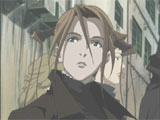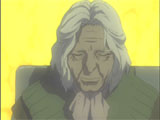

Quick Links:
Witch Hunter Robin, Volume 3: Inquisition
Power is not only an aphrodesiac, but also an affliction. Charles A. Beard once said, "Whom the Gods would destroy, they first make mad with power." This knowledge is ingrained in Japan's history, being a country whose collective madness for power rattled it more than once. Their World War II partner-in-crime, Germany, also brought about its own ruin - but while Japan's corrupted sense of pride (perpetuated effectively by its leaders at the time) is what did it in, Germany's social degradation was fueled by envy. Witch Hunter Robin is built around this more Western affliction - a power sought by those who are envious of those who have it. The third volume applies this principle to a world in which a witch's power is a very real thing.
The focus of Witch Hunter Robin takes a wild turn as the third volume begins. STN-J must hunt a witch named Jyuuzou Narumi who has gone mad with power. One could say that Narumi's demise was orchestrated by the powers that be, and Robin finds herself in the midst of a rude awakening soon after Narumi is apprehended. Robin comes in contact with a wise old witch, who challenges her worldview - she of the craft who would hunt her own. "...Watashi wa majo janai," (I'm not a witch) Robin says, almost in admission. (The fact that she used the Japanese word for witch intrigues me, for those hunted by STN-J in the show are labeled with the English word, "witch.")
The old witch paints a portrait of oppression - those who did not have powers lashing out at those who did. The ideas presented here transition flawlessly into the next part of the show, which brings that oppression into light. A visitor comes to the STN-J to conduct an inquisition, which in old Roman Catholic terms is a targeted inquiry with the aim of suppressing heresy. These inquisitions are conducted by a chosen few, who decide whether a particular witch will be a hunter or the hunted. The interesting thing here is that the inquisitor is the very same who decided to allow Robin to be a hunter. A witch named Shiro Hasuda is the one under question this time around, though the next episode arouses suspicion that the inquisition may have had another purpose.
This volume is where Witch Hunter Robin really gets interesting. It paints a realistic picture of power as a sickness - one that is a strong analog to the real world. The story makes references to witch slayings in the past, the most notable being the Salem witch trials, and this little history lesson ties into the story well. The show also uses the myth of Saturn** as a metaphor for witches and hunters. The rich symbolism and clever use of allegory in this volume give Witch Hunter Robin an astounding depth, and its relation to real historical events help it transcend its fictional boundary, for an immersive viewing experience.
Speaking of immersion, Bandai delivers again with elegant menus and great information. The packaging is a stylish shot of Robin all dressed in white, while the background is a boring picture of Sakaki and Michael. On the disc is some STN-J equipment pictures, the ever-interesting "Maelifica Compendium" liner notes, and an interview of vocalist Bana and composer Taku Iwasaki, the musical side of Witch Hunter Robin.
The first two volumes of Witch Hunter Robin comfortably operate in the realm of the supernatural, but the third volume brings it much closer to reality. Robin is forced in this volume to develop her own thoughts, and as we all know, thinking for yourself shortens your career in the business of secrecy. She better keep one hand on her glasses.
**Saturn is the Roman god of agriculture. He killed his father to take power over the gods, and then proceeded to swallow each of his children as they were born, to prevent one of them stealing his seat of power. Little did he know that his wife kept one child from him (Jupiter) who later took power over the gods, after making his father regurgitate the other children. There are several interpretations to this myth. One is that power is a disease that eventually destroys. Another is that the myth represents the idea of "out with the old, in with the new." Witch Hunter Robin makes use of both of these ideas. The witch hunters are Saturn, afraid and envious of the power the witches possess. And the witches are Saturn's offspring, hunted for their existence and nothing more.
Video Quality: A+ Audio Quality: A Presentation: A Content: A+ Overall: A+



